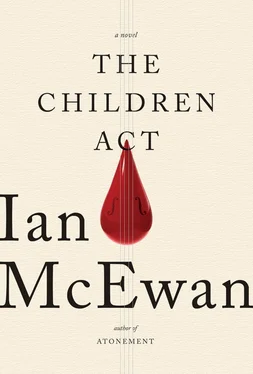“He is without doubt an exceptional child. I might even say, as one of the nurses did this evening, that he is a lovely boy, and I’m sure his parents would agree. He possesses exceptional insight for a seventeen-year-old. But I find that he has little concept of the ordeal that would face him, of the fear that would overwhelm him as his suffering and helplessness increased. In fact, he has a romantic notion of what it is to suffer. However…”
She let the word hang, and the silence in the room tightened as she glanced down at her notes.
“However, I am not ultimately influenced by whether he has or doesn’t have a full comprehension of his situation. I am guided instead by the decision of Mr. Justice Ward, as he then was, in Re E (a minor), a judgment also concerning a Jehovah’s Witness teenager. In the course of which he notes, ‘The welfare of the child therefore dominates my decision, and I must decide what E’s welfare dictates.’ That observation was crystallized in the clear injunction of the Children Act of 1989, which declares in its opening lines for the primacy of the child’s welfare. I take ‘welfare’ to encompass ‘well-being’ and ‘interests.’ I’m also bound to take into account A’s wishes. As I’ve already noted, he has expressed them clearly to me, as has his father to this court. In accordance with the doctrines of his religion derived from a particular interpretation of three passages in the Bible, A refuses the blood transfusion that will likely save his life.
“It is a fundamental right in adults to refuse medical treatment. To treat an adult against his will is to commit the criminal offense of assault. A is close to the age when he may make the decision for himself. That he is prepared to die for his religious beliefs demonstrates how deep they are. That his parents are prepared to sacrifice a dearly loved child for their faith reveals the power of the creed to which Jehovah’s Witnesses adhere.”
Again she stopped and the public gallery waited.
“It is precisely this power that gives me pause, for A, at seventeen, has sampled little else in the turbulent realm of religious and philosophical ideas. It is not part of the methods of this Christian sect to encourage open debate and dissent among the congregation at large, which is referred to by them, aptly some might say, as ‘the other sheep.’ I do not believe that A’s mind, his opinions, are entirely his own. His childhood has been an uninterrupted monochrome exposure to a forceful view of the world and he cannot fail to have been conditioned by it. It will not promote his welfare to suffer an agonizing unnecessary death, and so become a martyr to his faith. The Jehovah’s Witnesses, like other religions, have a clear notion of what awaits us after death, and their predictions of the end days, their eschatology, are also firm and very detailed. This court takes no view on the afterlife, which in any event A will discover, or fail to discover, for himself one day. Meanwhile, assuming a good recovery, his welfare is better served by his love of poetry, by his newly found passion for the violin, by the exercise of his lively intelligence and the expressions of a playful, affectionate nature, and by all of life and love that lie ahead of him. In short, I find that A, his parents and the elders of the church have made a decision which is hostile to A’s welfare, which is this court’s paramount consideration. He must be protected from such a decision. He must be protected from his religion and from himself.
“This has been no easy matter to resolve. I have given due weight to A’s age, to the respect due to faith and to the dignity of the individual embedded in the right to refuse treatment. In my judgment, his life is more precious than his dignity.
“Consequently, I overrule the wishes of A and his parents. My direction and declaration are as follows: that the agreement to blood transfusion of the first and second respondents, who are the parents, and the agreement to blood transfusion of the third respondent, who is A himself, are set aside. Therefore it will be lawful for the applicant hospital to pursue the medical treatments of A they regard necessary, on the understanding that these may entail the administration of blood and its products by transfusion.”
IT WAS ALMOST eleven o’clock when Fiona set off to walk home from the Courts of Justice. At this hour, the gates were locked and it wasn’t possible to cut through Lincoln’s Inn. Before turning up Chancery Lane she went a short way along Fleet Street to an all-night convenience store to buy a ready-made meal. The night before, it would have been a bleak mission, but she was feeling almost carefree, perhaps because she hadn’t eaten properly in two days. In the cramped, over-lit shop, the garish packaged goods, the explosive reds and purples and starburst yellows, throbbed on the shelves to the beat of her pulse. She bought a frozen fish pie and weighed up various fruits in her hand before deciding. At the checkout she fumbled with her money, spilling coins onto the floor. The nimble Asian lad working at the till trapped them neatly with his foot, and smiled protectively at her as he put the money in her palm. She imagined herself through his eyes as he took in her exhausted look, ignoring or unable to read the tailored cut of her jacket, seeing clearly one of those harmless biddies who lived and ate alone, no longer quite capable, out in the world far too late at night.
She was humming “The Salley Gardens” as she went along High Holborn. The fruit and the dense hard package of her supper swinging in its carrier bag against her leg were a comfort. The pie could cook in the microwave while she prepared for bed, she would eat in her dressing gown in front of a rolling-news channel, and then nothing would stand between her and sleep. No chemical prompt. Tomorrow was a high-end divorce, a famous guitarist, an almost-famous wife, a torch singer with an excellent solicitor, wanting some large portion of his twenty-seven million. Candyfloss compared to today, but the press interest would be just as intense, the law just as solemn.
She turned into Gray’s Inn, her familiar sanctuary. It always pleased her, the way the city’s traffic rumble died away as she went deeper in. A gated community of a historical sort, a fortress of barristers and judges who were also musicians, wine fanciers, would-be writers, fly fishermen and raconteurs. A nest of gossip and expertise, and a delightful garden still haunted by the reasonable spirit of Francis Bacon. She loved it here and never wanted to leave.
She entered her building, noted that the time switch for the lights was on, walked up toward the second floor, heard the usual jagged creak on the fourth and seventh stairs and on the final run to her landing saw everything and immediately understood. Her husband was there, just getting to his feet, a book in his hand, and behind him against the wall, his suitcase had been a kind of seat, and his jacket was on the floor beside his briefcase, which was open, with papers spilling out. Locked out, working while waiting. And why not? He looked rumpled and irritated. Locked out and waiting a very long time. Clearly not back for fresh shirts and books, not with his suitcase there. Her immediate thought, a gloomy and selfish one, was that now she would have to share her single-portion supper. And then she thought she wouldn’t. She’d rather not eat.
She came up the last few stairs onto the landing, saying nothing as she reached for her keys, the new keys, from her bag, stepped around him and went to the door. It was for him to speak first.
His tone was querulous. “I’ve been phoning you all evening.”
She unlocked the door and walked in without looking back and went into the kitchen, dumped her stuff on the table and paused there. Her heart was beating far too hard. She heard his bad-tempered breathing as he brought in his luggage. If there was to be a confrontation, which she didn’t want, not now, the kitchen was too confined a space. She took her briefcase and went quickly into the sitting room, to her usual place on the chaise longue. Spreading a few papers around where she sat was a form of protection. Without them she would not know what to do with herself.
Читать дальше












